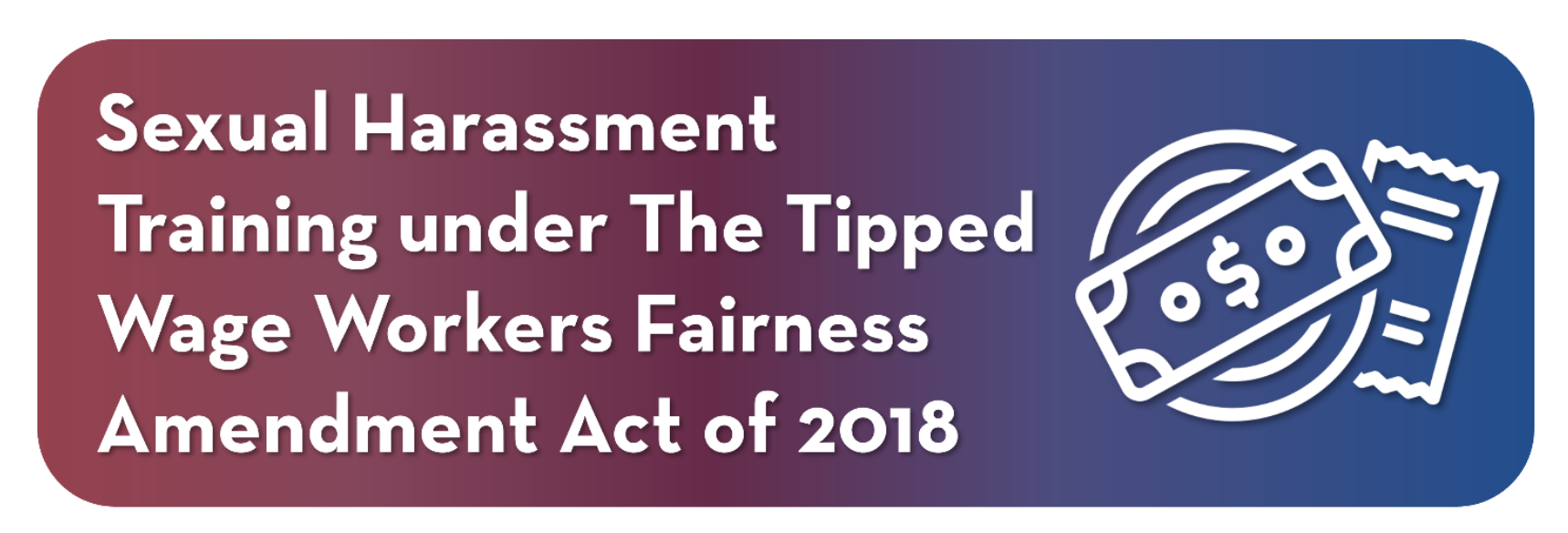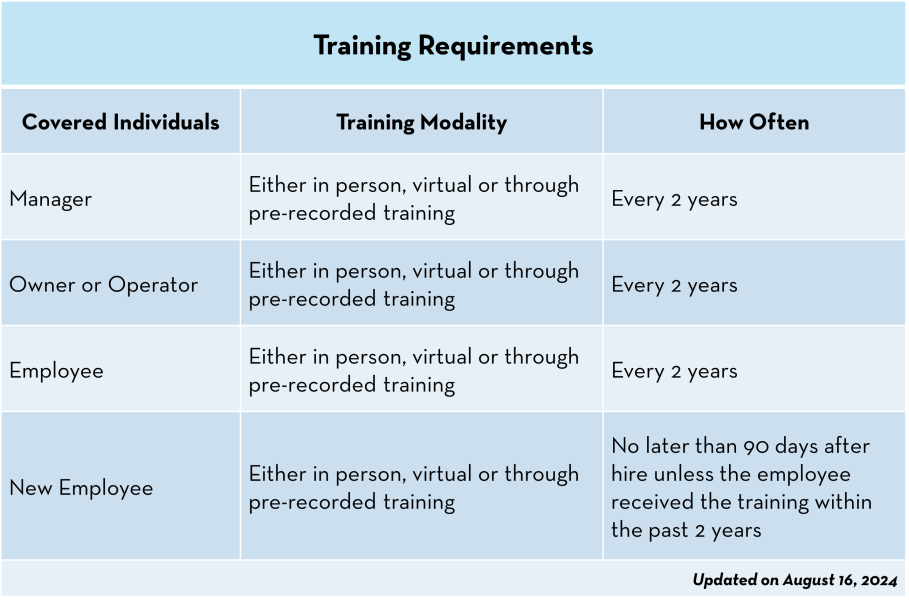Find out about the law that requires District employers who hire individuals earning tips as wages to inform their employees about their rights and benefits. New FAQ sheet available!

Tipped Wage Workers Fairness Act

Sections On This Page:
Section 1: What Is the Law and OHR’s Responsibilities?
Generally speaking, The Tipped Wage Workers Fairness Amendment Act (TWWF) enhanced tipped wage worker rights, increased public education, and improved systems for reporting wage theft. All of these newly added enhancements are implemented by the Department of Employment Services (DOES).
This Act also required sexual harassment training and reporting. This second part is enforced by the DC Office of Human Rights. Specifically, tipped wage businesses must provide sexual harassment training to its owners, operators, managers, and employees. Additionally, businesses must also report sexual harassment incidents and submit sexual harassment policies to the OHR.
Section 2. Compliance Requirements:
Below provides details on how a business can comply with these requirements and when and how businesses must report to OHR. There are three main components: (1) conducting training; (2) reporting on compliance with training; and (3) submission of sexual harassment policy and reporting on sexual harassment complaints received.
- The training course must include how to respond to, intervene in, and prevent sexual harassment by co-workers, management, and patrons.
- The below table shows who must be trained, the method of training, and how often each covered individual must be trained.

- Training must be conducted using an OHR certified trainer. For a list of OHR certified trainers, click here (updated November 22, 2024).
2. Reporting on Compliance with Training
- Employers must train new employees within 90 days of hire.
- Employers must provide the anti-sexual harassment training every two years. For example, if the employer provided anti-sexual harassment training in January 2022, they must provide another anti-sexual harassment training through a certified trainer by January 2024. Please contact [email protected] for more information regarding training requirements.
- Businesses must submit their training compliance report to [email protected] within 30 business days of the training session. Report templates may be obtained through certified trainers or by contacting
[email protected].
3. Submission of Sexual Harassment Policy and Reporting on Sexual Harassment Complaints Received
- Sexual Harassment Policy
- Employers must:
- Have a sexual harassment policy outlining how employees can report instances of sexual harassment to management and to OHR.
- Distribute their sexual-harassment policy to all employees and post it in a conspicuous place accessible to all employees.
- File the sexual harassment policy with OHR.
- Internal sexual harassment complaints
- Employers must submit a compliance report to OHR detailing the number of instances of sexual harassment reported to management and indicate the total number of alleged harassers who were: (1) Non-managerial employees, (2) Managerial employees, (3) owners, or (4) operators.
- For calendar year 2023 submissions, the platform reopened on January 1, 2024, and will remain open until the deadline for submitting a copy of your sexual harassment policy and complete certifications by May 31, 2024.
- Extended Deadline for Submissions (as of June 2024): Please click here to submit your business sexual harassment policy and number of sexual harassment claims for calendar year 2023 by August 31, 2024, to complete your 2023 required documentation .
- Employers must:
Additionally, it is required that Employers must post, maintain, and distribute their anti-sexual harassment policy to all employees, including how to file a sexual harassment complaint with OHR.
Section 3: Frequently Asked Questions:
During this process, OHR has conducted outreach and training sessions in all corners of the city, engaging with the public and addressing their questions and concerns. We have compiled a list of FAQs and can be viewed here (updated September 9, 2024). Please note that while these FAQs cover common topics, they may not encompass all possible scenarios. If you think you have a FAQ worthy question, please reach by emailing [email protected]
Section 4. How to File a Violation Complaint with the Office of Human Rights
If you believe that an employer in the private sector has wrongfully denied or violated any of these rights and benefits, including a sexual harassment claim, you can file a complaint with OHR within one year of the incident; simply complete an intake questionnaire and submit it to OHR at https://ohr.dc.gov/service/file-discrimination-complaint.
Questions about the OHR process can also be answered by phone at (202) 727-4559
Questions about the DOES process can also be answered by phone at (202) 671-1880
For inquiries regarding the types of complaints OHR adjudicates, email OHR at [email protected], or to submit an anonymous tip, email [email protected]
Section 5. Additional Resources
- Fact Sheet
- Tipped Wage Workers Fairness Amendment Act - Fact Sheet (English)
- የማበረታቻ ደመወዝ የሚያገኙ ሠራተኞችን በተመለከተ የፍትሃዊነት ማሻሻያ ህግ (Amharic)
- 《小费员工公平修正法案薪资》(Chinese)
- Loi portant modification de la loi sur l’équité pour les travailleurs rémunérés au pourboire (French)
- 팁 임금 근로자 공정성 개정법 (Korean)
- Enmienda de Ley de Igualdad para Trabajadores Asalariados que Reciben Propinas (Spanish)
- Đạo Luật Sửa Đổi Về Sự Công Bằng Đối Với Người Lao Động Nhận Tiền Lương Típ (Vietnamese)
This webpage was last updated on November 22, 2024


